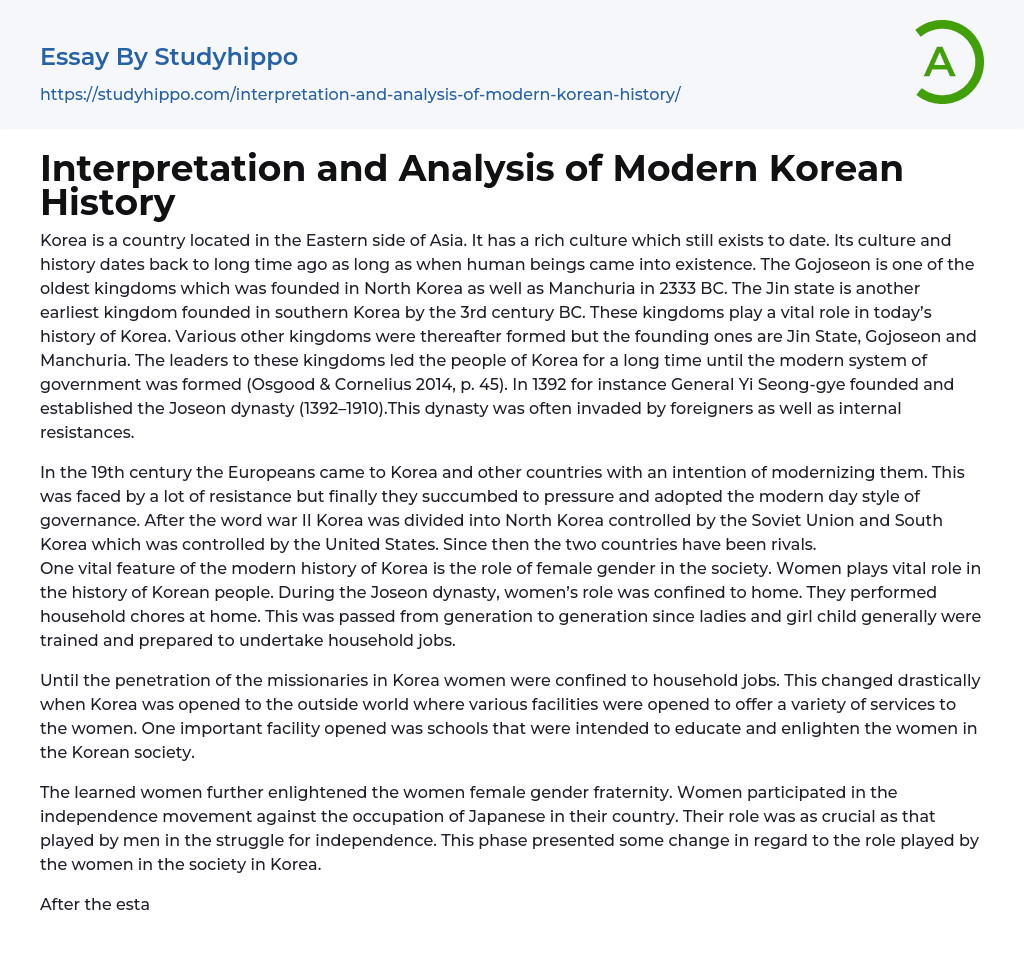

Interpretation and Analysis of Modern Korean History Essay Example
Korea, which is situated in Eastern Asia, possesses a continuously lively culture.
The culture and history of Korea have roots that date back to the earliest existence of human beings. One of the oldest kingdoms, Gojoseon, was founded in North Korea and Manchuria in 2333 BC. Another early kingdom, the Jin state, was established in southern Korea by the 3rd century BC. These kingdoms have had a significant impact on the history of Korea today. While other kingdoms were later formed, the founding ones are Jin State, Gojoseon, and Manchuria. The leaders of these kingdoms governed the people of Korea for an extended period until the formation of the modern system of government (Osgood & Cornelius 2014, p.).
The Joseon dynasty (1392-1910) was established by General Yi Seong-gye and faced foreign invasions and internal resistance. In the 19th century, European nations aimed to modernize Korea and other countries. Despit
...e facing opposition, these countries eventually adopted modern governance systems due to pressure.
Following World War II, Korea underwent a division resulting in the creation of two separate nations: North Korea, under Soviet Union control, and South Korea, under United States control. This division sparked an enduring rivalry between these two countries. Notably, the role of women in Korean society holds great significance in its history. Particularly during the Joseon dynasty period, women played a pivotal role primarily centered around domestic duties performed within their households.
Throughout generations, women and young girls have traditionally received training in domestic responsibilities. Nevertheless, the emergence of missionaries in Korea led to a significant transformation in societal expectations towards women. This shift allowed for the integration of global influences, presenting new prospects for them. The
establishment of schools aimed at educating and empowering women within Korean society became a catalyst for change. These educated women played a crucial role in enlightening their female peers.
Women in Korea played a crucial role and made significant contributions during the fight against Japanese occupation, which was just as important as that of men. This period also brought about substantial societal changes for women. In 1948, with the establishment of the Republic of Korea, women received constitutional rights that ensured equal opportunities in employment, public life, and education. As a result, they gained the freedom to pursue diverse careers and actively contribute to the country's economic development.
Due to these changes, women in Korea gained equal educational opportunities, leading to an improvement in their academic achievements. By 1966, a considerable number of educated women had emerged in Korean society, empowering them to take on traditionally male-dominated roles. As women started participating in economic activities, the Korean economy experienced substantial growth and subsequently improved living conditions across the country.
The number of women employed in various state department jobs has increased due to more women pursuing higher education. Back in 1975, only 2% of women in the labor force held professional and managerial positions, while 4% had clerical roles. However, by 1998, the percentage of women in managerial and professional roles had quickly risen to reach 12.6%. The government played a significant role in promoting women's participation in the labor force through the Equal Employment Act passed in 1987. This law offered opportunities for Korean women to engage in different activities and professions, leading to improvements across industries' productivity and profitability. Presently, Korean women can be found working
in fields such as education, medicine, arts, engineering scholarships, and sports. All things considered, women are making notable contributions to society.
The progress and empowerment of women in Korea have played a crucial role in the economic growth of the country, positioning it as an emerging developing nation. These advancements have led to enhanced living standards for its citizens and contributed to the recent growth of the Korean economy. Furthermore, women now enjoy equal opportunities to engage in politics, which was previously exclusive to men. This summary highlights the significant historical transformation of women's societal roles in Korea.
Over time, women have increasingly taken on roles that were traditionally designated for men.
- American Civil War essays
- Atomic Bomb essays
- Attack essays
- Cold War essays
- Crimean War essays
- Diplomacy essays
- Emilio Aguinaldo essays
- Emperor essays
- Hitler essays
- Iraq War essays
- Korean War essays
- Mexican American War essays
- Nazism essays
- Nuclear Weapon essays
- Philippine Revolution essays
- Revolutionary War essays
- Rwanda essays
- The Spanish American War essays
- Trench Warfare essays
- Tribe essays
- Vietnam War essays
- War of 1812 essays
- Western Front essays
- World War I essays
- World War Ii essays
- Afghanistan essays
- Africa essays
- America essays
- Asia essays
- Australia essays
- Caribbean essays
- City essays
- Developing Country essays
- Dubai essays
- Earthquake essays
- Europe essays
- Fracking essays
- Georgia essays
- Middle East essays
- Natural Disaster essays
- New Zealand essays
- North Korea essays
- South Korea essays
- Thailand essays
- Travel essays



